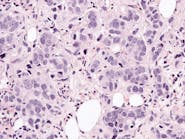Mayo Clinic Comprehensive Cancer Center researchers have identified key findings that can assist clinicians in predicting whether a patient with advanced colorectal cancer will benefit from immunotherapy.
The study was published in the journal Clinical Cancer Research and highlights the potential of using spatial analysis of specific proteins as a predictive tool for selecting appropriate candidates for PD-1 blockade immunotherapy in colorectal cancer, ultimately improving treatment outcomes and minimizing unnecessary treatments.
The study authors found that the distance between cells that express programmed cell death protein 1 (PD-1) and programmed cell death ligand 1 (PD-L1) within the tumor can predict the outcome of immunotherapy in colorectal cancers with a defective DNA repair system, known as mismatch repair. PD-1 and PD-L1 are immune checkpoint proteins, primarily located on the surface of immune cells, whose binding is blocked by drugs known as checkpoint inhibitors.
According to the researchers, among the patient tumors that were examined, 60% had an increased number of cells with PD-1 and PD-L1 in close proximity, meaning that 60% of these patients are likely to benefit from immunotherapy. Furthermore, such data has the potential to assist clinicians in selecting patients for treatment while the other 40% who are less likely to benefit from immunotherapy could be treated with combination therapy or another type of treatment.





